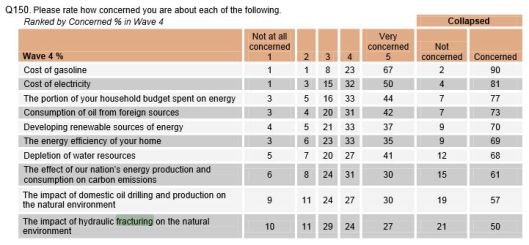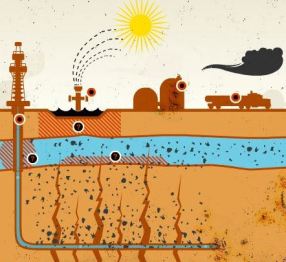A certain detachment from reality characterizes most who call themselves “conservative,” and it shows up nowhere more clearly than in the debate over fracking, as in one notable debate over the issue that typifies not just the denial of the mounting evidence, but denial that it will impact policy.
Recently, poll after poll is showing a decided shift in public opinion toward the practice of fracking, a means of extracting natural gas and oil locked in layers of semi-permeable rock strata deep beneath the surface. The process involves sending out several lateral bores from the vertical bore first drilled. Then, explosive charges are set off to “fracture” the pipe and rock before the millions of gallons of toxic chemical laced water and sand are pumped into the well to open the faults opened by the explosive charges.
Initially, the public knew virtually nothing about the process and its potential to harm the environment. Josh Fox’ Gasland brought awareness of the issues. As they became aware, public opinion in areas where fracking like New York, California, the Western provinces of Canada, and many other locations.
Pennsylvanians who have been living with the news about fracking overwhelmingly express concern over the potential threat fracking poses to the environment. Nationally, 65 percent of Americans have believed that tighter regulation is necessary since 2010. Similarly, 72 percent of Ohio residents have expressed the opinion that fracking should be halted until it is studied further.
Albeit equally unsettling, the public in England has indicated that they would prefer having a nuclear power plant nearby to having a fracking operation.
At the same time, it should come as no surprise that industry funded disinformation peddlers, like Energy InDepth (EID), have their own polls to crow about, like this report in 2012 and this more recent article. Careful review of the polls reveals that the context of the 2012 Rasmussen poll framing the question as an energy independence issue would have tended to influence the responses to be more favorable.
Less attention is necessary though for a casual reader to see that EID misrepresented both the University of Texas (UT) poll in 2013, and the level of support for fracking reflected in the results. What it most clearly showed is that public awareness of the issue is still abysmally low, and that it has fallen off from the level reported in the Rasmussen poll.

Respondents to the UT poll overwhelming expressed concern over the impact of oil and gas production in the environment.
More scrupulous review of the UT poll reveals much that it is certain that EID did not want to mention. When asked, “When it comes to dealing with energy issues that face our nation, do you think things are headed in…?” respondents overwhelmingly responded “Wrong direction.” When asked what they “think about the impact that U.S. energy production and consumption has on the environment. In the next 12 months,” over four times as many people responded that the impact would be “Higher.”
Disconcertingly, the poll question regarding what the respondents though to be the greatest contributor to global climate change reveals little firm understanding of the issue, and the level of support for development of domestic oil and gas reserves demonstrates how little aware they are of the myth of energy independence. On the bright side, they overwhelmingly distrusted the oil and gas industry as a source of information in the issues.
While the public is slowly coming to an understanding of the issues related to fracking, policy is lagging behind. Much work getting the message out remains for the environmental community, and a great deal of political pressure will be needed to be applied from the local to national levels if we are to prevail and prevent the degradation of our environment.


You must be logged in to post a comment.